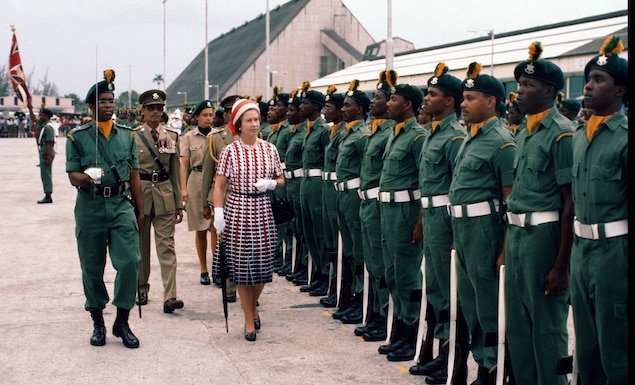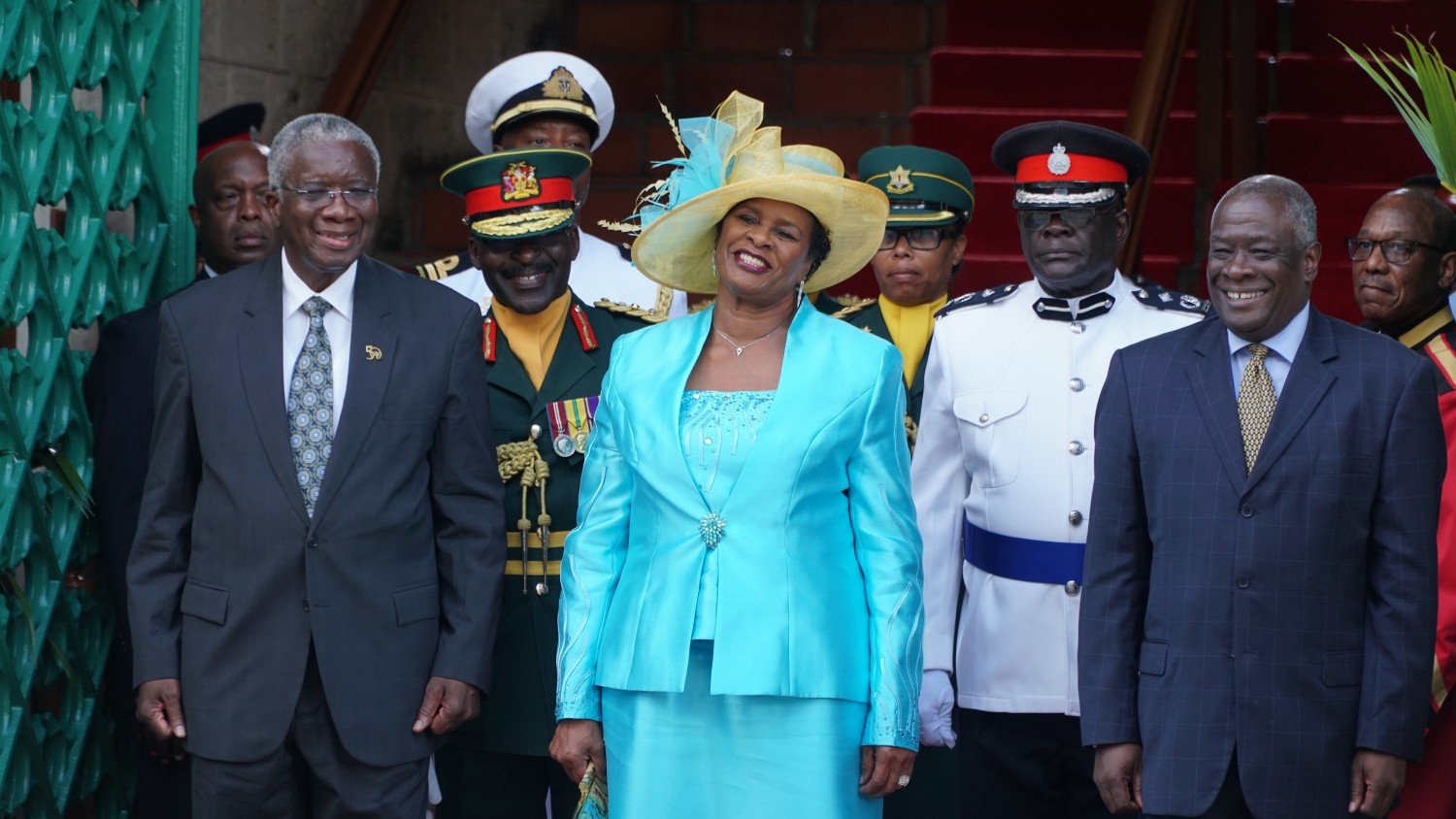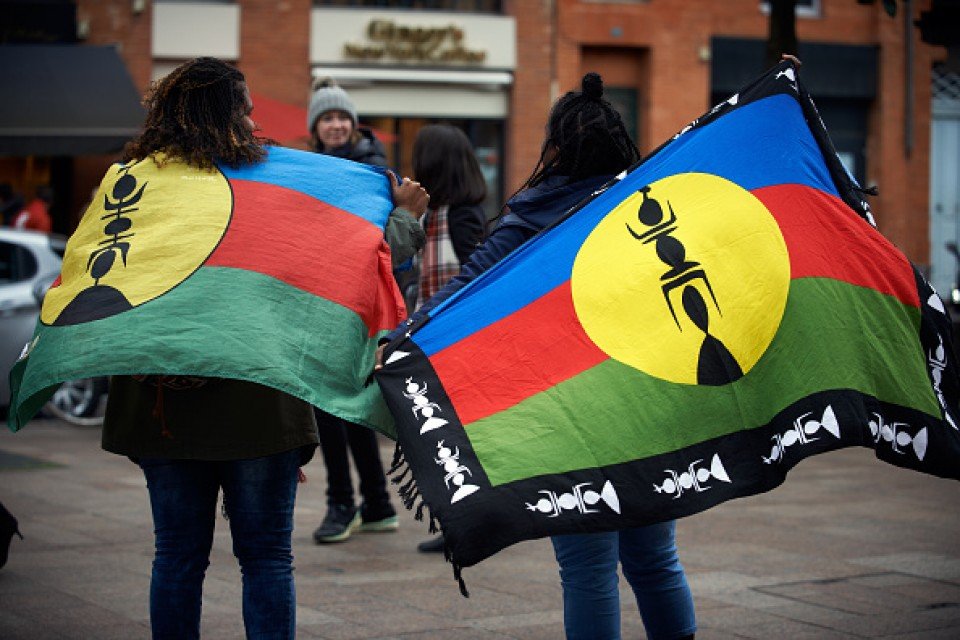Barbados To Declare Itself A Republic – Casting Off The Last Vestiges Of British Colonialism
When the clock strikes midnight tonight in Bridgetown, Barbados (4am Irish time), the small Caribbean nation will declare itself a Republic, severing a near 400 year-old relationship with the British crown. In doing so they will be removing Queen Elizabeth Windsor II as head of state, an act signalling the death knell of British domination of the island.
British Queen Elizabeth Windsor ll inspects a guard of honour as she arrives in Barbados in October 1977. She will be replaced as its head of state by Sandra Mason, the island’s current Governor-General.
Beginning in the early 17th century, Barbados was gradually colonised, with the first English ship arriving in 1625, and a settlement colony established soon after in 1627. The island was renowned for its plentiful cash crops of tobacco, sugar and cotton, this being the key motivation for English control of Barbados.
Ireland's connection to Barbados began in the early 17th century when relatively small numbers of people travelled from Ireland to the Caribbean island. In the decades after many thousands more followed, most notably during the mass deportations of political prisoners that accompanied the Cromwellian conquest of Ireland. Whether serving lifetimes of servitude, or as so-called indentured servants, life for these Irish immigrants was extremely harsh as they tended to cash crops in the fields or endured other forms of back-breaking labour.
Around this same time the island also became a hub for the Transatlantic slave trade, facilitating the kidnap and exploitation of millions of Africans kidnapped from their homes and forced into a life of chattel slavery. People kidnapped from Africa were re-exported to other places in the British Colonies via Barbados, while those who were kept on the island became part of a brutal chattel slavery system where huge sugarcane profits were derived from forced servitude.
The system of slavery dominated the social and economic life of Barbados for almost two hundred years, with an estimated half a million African people forced on to the island to toil in slavery on the sugarcane plantations, resulting in countless numbers perishing from disease, exhaustion and murder at the hands of slave traders. The wealth accumulated from the Transatlantic slave trade was crucial to the growth of global capitalism and the British Empire, along with the expansion of European imperialism and colonialism.
Barbados eventually gained its independence from Britain in 1966, although the island was to remain a constitutional monarchy under the British Queen Elizabeth Windsor II, that is of course until tonight. Speaking in September 2020, after plans for declaring a Republic were announced, Governor-General of Barbados, Sandra Mason declared “This is the ultimate statement of confidence in who we are and what we are capable of achieving. The time has come to fully leave our colonial past behind.” Barely a year on from this statement, the goal of Barbados becoming a Republic, abandoning a torrid colonial past, is only hours away, with the day also being Barbados’ independence day.
Speaking in September 2020, after plans for declaring a Republic were announced, Governor-General of Barbados, Sandra Mason declared “This is the ultimate statement of confidence in who we are and what we are capable of achieving. The time has come to fully leave our colonial past behind.”
In the last decade there has been a visible increase in anti-colonial sentiment among those in nations previously, or currently colonised, although all these attempts have thus far ended in failure. Fiji’s proposals to remove the Union Jack from its flag in 2013 eventually floundered before being abandoned in 2016. New Zealand held a referendum to do the same in 2016, with the proposal defeated by a small majority. At present there are attempts by those in the French colony of New Caledonia to declare independence, with the third and final referendum on the issue to be held early next month, although the results in the first two referenda decided against independence.
New Caledonians go to the polls on 12 December in the third and final referendum to decide whether to declare independence from France, or to continue as a French colony.
This makes the decision of Barbadians to declare a Republic even more significant, with citizens in nations currently under colonial rule looking on with interest.
Here in Ireland British colonialism remains a reality. The north-eastern Six Counties of Ireland remains under occupation from Britain, this representing the single biggest challenge facing the Irish people at present. But, with the strength of Britain’s stranglehold on Ireland declining as a result of several factors, the possibility of a united, independent Ireland is now more likely than it has been in centuries.
Just as a new Republic is declared in Barbados, we in Ireland must recommit ourselves to the building of the same. A popular, peaceful, inclusive wave of support for Irish reunification and for the construction of A New Republic must be built across Ireland and beyond if this possibility is to be made a reality.
Those who want to see not only a united Ireland, but also a radically different economic system and social order must seize the opportunities that future constitutional change will bring.
The Republic we help build will not be a Republic in name only, it will be A New Republic that will put the needs of the many ahead of the greed of the few.
A New Republic that will provide all of our citizens with the housing, healthcare, education and other essential services that they need to reach their full potential.
A New Republic that will protect and manage our natural environment for the benefit of future generations.
A New Republic that will be secular, egalitarian and internationalist.
A New Republic that will support our native language and culture.
A New Republic that will provide secure, properly paid employment for everyone that can work and support for those that can’t.
Éirígí For A New Republic congratulates and commends the Barbadian people on their declaration of a new Republic, and the rejection of Britain’s colonial hold on the country, in favour of joining those nations that have chosen a political system free from the anti-democratic vestiges of colonialism and monarchy.
For our part in Ireland we are committed to building maximum support for a New all-Ireland Republic that will deliver equality and justice for all through the creation of a democratically-controlled and environmentally sustainable economy.




